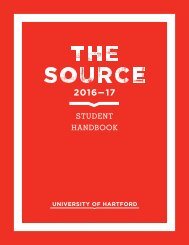advising
Create successful ePaper yourself
Turn your PDF publications into a flip-book with our unique Google optimized e-Paper software.
ADVISING HANDBOOK FOR FIRST-YEAR STUDENTS<br />
College of Education, Nursing<br />
and Health Professions*<br />
The College of Education, Nursing and Health Professions (ENHP)<br />
takes a hands-on approach to career-oriented programs in education<br />
and the health professions. Service learning and clinical experience<br />
are essential components throughout the student’s undergraduate<br />
degree program, and are required in a number of classes for<br />
education and health professions majors. Service learning experiences<br />
and specialization courses that begin during the first semester of<br />
the first year help education students determine if their selected<br />
major will move them toward the career that is appropriate for them.<br />
Practical experiences help give students the confidence they will need<br />
in entering the working world after graduation. Course requirements<br />
include three components: general education courses (including All-<br />
University Curriculum course requirements), specialization or major<br />
course requirements, and electives.<br />
Advising<br />
ENHP faculty take pride in the college’s <strong>advising</strong> system. Students<br />
work closely with their advisors, who take both an academic and a<br />
personal interest in the professional development of each individual.<br />
Advising begins in the first semester of the first year through<br />
ENHP 140 Freshman Dialogue, a one-credit course designed to<br />
meet the needs of first-year students as they transition to college life,<br />
or for students in the Health Sciences program, HS 140 and HS<br />
141. Students meet with their advisors one hour per week to explore<br />
different aspects of the University, as well as their personal and<br />
academic goals and professional competencies. (Following the first<br />
semester, health professions students are assigned to a specific faculty<br />
advisor within their major.)<br />
Course Selections for First-Semester Students<br />
Most first-semester students register for a total of 13–17 credits<br />
if they are health professions majors, or 16–17 credits if they<br />
are education majors. Students with declared, diagnosed, and<br />
documented learning disabilities may wish to take the minimum 12<br />
or 13 credits required for full-time status. They are also eligible to<br />
take advantage of the services of Learning Plus, an office dedicated<br />
specifically to the needs of learning-disabled students. Students<br />
who take fewer credits a semester might not be able to graduate in<br />
four years.<br />
Department of Education<br />
Early Childhood Education<br />
Birth through kindergarten or preschool through grade 3<br />
Elementary Education Grades 1 through 6<br />
Integrated Special Education/Elementary Education<br />
Students successfully completing this major and thereafter attaining<br />
teaching certification are prepared to teach elementary school,<br />
grades 1 through 6; and comprehensive special education, grades<br />
kindergarten through 12, covering emotional disturbance, learning<br />
disabilities, and intellectual disabilities.<br />
General Education Majors (For those who have not yet decided on<br />
a major within the Department of Education)<br />
All students select the following courses: Dialogue, Introduction<br />
to Education, Academic Writing I, and an All-University<br />
Curriculum course from one of the following categories: AUCA,<br />
AUCC, AUCW, or AUCT (see page 9). Students who plan to<br />
teach should choose a course from the Discovering America series<br />
when taking an AUCW. Students also select two courses from the<br />
following: Contemporary Mathematics or Introduction to Modern<br />
Mathematics; American Government; Introductory Psychology; and<br />
Introduction to Sociology.<br />
Subject-Area Majors and Concentration Areas<br />
All students in the Department of Education who are pursuing an<br />
education major leading to teacher certification are required to have a<br />
second major outside of the education field, either in another major<br />
offered at the University or in an interdisciplinary major, such as<br />
the college’s state-approved behavioral studies major. This second<br />
major requirement is the result of State of Connecticut regulations<br />
for certification. The interdisciplinary major option is available to all<br />
education majors who wish to teach, with the exception of secondary<br />
education English or mathematics majors, whose second major is<br />
English or mathematics, respectively.<br />
Behavioral studies combines study in the fields of psychology,<br />
sociology, political science, and communication. Students who plan<br />
to take the behavioral studies major should take an introductory<br />
course in one of these four areas. Students who wish to pursue a<br />
second major other than behavioral studies may choose a course<br />
recommended for Arts and Sciences majors in their chosen subjectarea<br />
major. Students who wish to study a foreign language or sign<br />
language may choose a modern language course during the first<br />
semester.<br />
* Nursing—Nursing is not available as an undergraduate major leading to a bachelor’s<br />
degree and to licensure as an RN. Nursing offers an advanced program to licensed<br />
and practicing registered nurses who wish to obtain a B.S.N. degree. This program<br />
is not open to traditional first-year or transfer students but only to those who are<br />
already RNs.<br />
26



